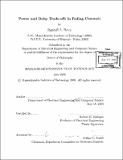| dc.contributor.advisor | Robert G. Gallager. | en_US |
| dc.contributor.author | Berry, Randall A. (Randall Alexander) | en_US |
| dc.contributor.other | Massachusetts Institute of Technology. Dept. of Electrical Engineering and Computer Science. | en_US |
| dc.date.accessioned | 2005-08-23T12:00:00Z | en_US |
| dc.date.available | 2005-08-23T12:00:00Z | en_US |
| dc.date.copyright | 2000 | en_US |
| dc.date.issued | 2000 | en_US |
| dc.identifier.uri | http://hdl.handle.net/1721.1/9290 | |
| dc.description | Thesis (Ph.D.)--Massachusetts Institute of Technology, Dept. of Electrical Engineering and Computer Science, 2000. | en_US |
| dc.description | Includes bibliographical references (p. 193-198). | en_US |
| dc.description.abstract | Energy is a constrained resource in mobile wireless networks. In such networks, communication takes place over fading channels. By varying the transmission rate and power based on the current fading level, a user in a wireless network can more efficiently utilize the available energy. For a given average transmission rate, information theoretic arguments provide the optimal power allocation. However, such an approach can lead to long delays or buffer overflows. These delays can be reduced but at the expense of higher transmission power. The trade-offs between the required power and various notions of delay are analyzed in this thesis. We consider a user communicating over a fading channel. Arriving data for this user is stored in buffer until it is transmitted. We develop several buffer control problems which fit into a common mathematical framework. In each of these problems, the goal is to both minimize the average transmission power as well as the average "buffer cost". In two specific examples, this buffer cost corresponds to the probability of buffer overflow or the average buffer delay. These buffer control problems are analyzed using dynamic programming techniques. Several structural characteristics of optimal policies are given. The relationship of this model to the delay-limited capacity and outage capacity of fading channels is discussed. We then analyze the asymptotic performance in two cases - the probability of buffer overflow case and the average delay case. In both cases, we bound the asymptotic performance and provide simple policies which are asymptotically optimal or nearly optimal. Finally we extend this analysis to a model with multiple users communicating over a multiple-access channel to a common receiver. The single user results for the probability of buffer overflow case are generalized to this multiple user situation. Extensions to other multi-user models are also discussed. | en_US |
| dc.description.statementofresponsibility | by Randall A. Berry. | en_US |
| dc.format.extent | 198 p. | en_US |
| dc.format.extent | 13765063 bytes | |
| dc.format.extent | 13764821 bytes | |
| dc.format.mimetype | application/pdf | |
| dc.format.mimetype | application/pdf | |
| dc.language.iso | eng | en_US |
| dc.publisher | Massachusetts Institute of Technology | en_US |
| dc.rights | M.I.T. theses are protected by copyright. They may be viewed from this source for any purpose, but reproduction or distribution in any format is prohibited without written permission. See provided URL for inquiries about permission. | en_US |
| dc.rights.uri | http://dspace.mit.edu/handle/1721.1/7582 | |
| dc.subject | Electrical Engineering and Computer Science. | en_US |
| dc.title | Power and delay trade-offs in fading channels | en_US |
| dc.type | Thesis | en_US |
| dc.description.degree | Ph.D. | en_US |
| dc.contributor.department | Massachusetts Institute of Technology. Department of Electrical Engineering and Computer Science | |
| dc.identifier.oclc | 45838353 | en_US |
